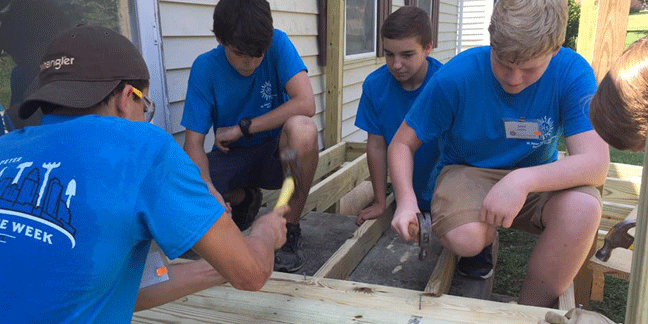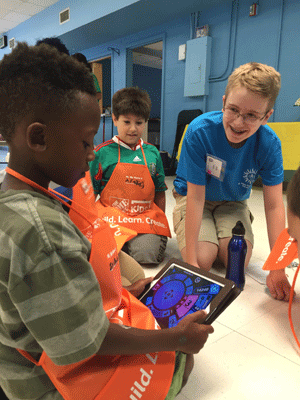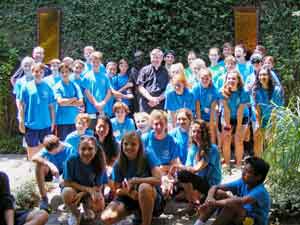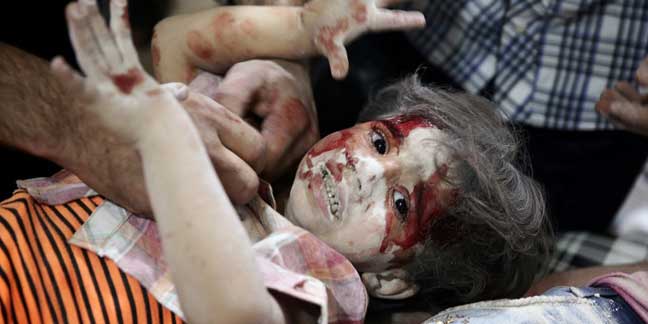 CHARLOTTE — More than 50 young people at St. Peter Church in Charlotte took part in "Summer Teen Service Week" July 18-22, helping more than 1,000 people in various locations across the city.
CHARLOTTE — More than 50 young people at St. Peter Church in Charlotte took part in "Summer Teen Service Week" July 18-22, helping more than 1,000 people in various locations across the city.
The fourth annual service project enabled the teens at the Jesuit-run parish to put their faith into action and give back to the community, serving others with hard work, compassion and mercy while also practicing Ignatian spirituality. Through the people they served, fellow youth and their own inner movement towards God, the teens were able to grow in their relationship with Christ.
Each day began with prayer and discussion before the teens set off for service projects at Holy Angels, Alexander Youth Network and the soup kitchen at Ascension Lutheran Church, among other locations.
They cleaned up a creek and built a wheelchair ramp for a woman in need, built "talking lap desks" for schoolchildren in South Sudan, and played bingo with residents at McCreesh Place.
They also heard from guest speakers Patricia Shafer and Jordan Koletic of Mothering Across Continents, Suzanne Wittebort and Jean Miller of Druid Hills Academy, Dave Zablotny of the Kino Border Initiative, Julie Glaser of the Jesuit Volunteer Corps and Allain Andry of the parish's Ignatian Spirituality team.
On the final day, they ate a humble "Rations of Hope" lunch of beans, rice and bread – a learning experience in memory of the refugee camp experiences of the former "Lost Boys" of Sudan.
"Teen Service Week really helped me see what some people have to live like, and I felt God telling me through all of the people that I worked with that I should start doing something to not only help them but to show them God's light, just like they showed me. I will definitely be coming back next summer for more," said participant Sarah Porter Kuhn.


 CHARLOTTE — Years of civil war and devastation in Syria have created an unprecedented humanitarian crisis, pushing millions to flee their homes in search of safety. Half the country’s pre-war population – more than 11 million people – have been killed or forced to leave.
CHARLOTTE — Years of civil war and devastation in Syria have created an unprecedented humanitarian crisis, pushing millions to flee their homes in search of safety. Half the country’s pre-war population – more than 11 million people – have been killed or forced to leave.
The U.S. State Department estimates resettling 13,000 of these Syrian refugees in the new fiscal year which began Oct. 1, working in partnership with the U.S. Conference of Catholic Bishops and Catholic Charities agencies nationwide, among others.
In the Diocese of Charlotte, five more Syrian families arrived to safety in October, a total of 28 people. Catholic Charities Diocese of Charlotte officials said they expect to receive three more refugee families in November.
“They are expecting Syrians to be the number one refugee group (this fiscal year),” said Catholic Charities case manager Ashir Haji-Mohamed. “They are coming from Turkey, Jordan and Lebanon.”
Catholic Charities is welcoming these families and providing them with the individualized assistance they need to start new lives in the United States. Case managers work one-on-one with each family and, with some limited federal and state government financial assistance, each family is set up in an apartment and given help in finding jobs and enrolling their children in school.
“When they get here, they are very happy to be here,” Haji-Mohamed explained.
The local Syrian community in Charlotte is also assisting the new refugees. In addition to all that Catholic Charities provides with housing, clothing, food and resettlement assistance, the local community prepares food for new families for the first 10 days after their arrival.
Last fiscal year, the number of Syrian refugees who cleared the federal government’s review process and arrived in the U.S. totaled 12,391 people.
Catholic Charities’ primary goal is to help all refugees work toward self-sufficiency and eventually attain citizenship, Haji-Mohamed said.
With the assistance of Catholic Charities, refugees gain success as contributing members of the community and the local economy. Refugees pay taxes and re-pay their travel expenses. The majority of adults who are able to work are able to find jobs within three to five months, and most refugees gain financial independence within two to three years, with 60-75 percent eventually becoming homeowners.
“When you see your client who is self-sufficient and is driving and is going to work, and he doesn’t need your services anymore, it makes you very happy,” Haji-Mohamed added.
Catholic Charities resettles between 300 and 400 refugees each year from all over the world. Since 1975, the agency has resettled more than 15,000 refugees representing 27 nationalities.
— SueAnn Howell, Senior reporter. Catholic Charities Diocese of Charlotte contributed.
Pictured: A child reacts inside a field hospital after air strikes Sept. 12 in Damascus, Syria. In the wake of intensified attacks in Syria, Pope Francis called for an immediate cease-fire, even if temporary, so that civilians, especially children, could be rescued from the ruins. (CNS | Bassam Khabieh, Reuters)
How can you help?
Catholic Charities encourages people to donate money to aid its refugee resettlement work. Donations of furniture and household items, as well as volunteers to pick up donations and help set up apartments, are also welcome.
MORE INFORMATION about the needs of Catholic Charities and opportunities for volunteering is online at www.ccdoc.org. Click on the “Donate” or “Volunteer” tab to see all the ways you can assist and welcome refugees.
MONETARY DONATIONS can be made online or mailed to Catholic Charities Diocese of Charlotte, 1123 S. Church St., Charlotte, NC 28203.
FOR INQUIRIES about how you can volunteer or how your parish can sponsor a refugee family, contact Catholic Charities Diocese of Charlotte at 704-370-3262.

